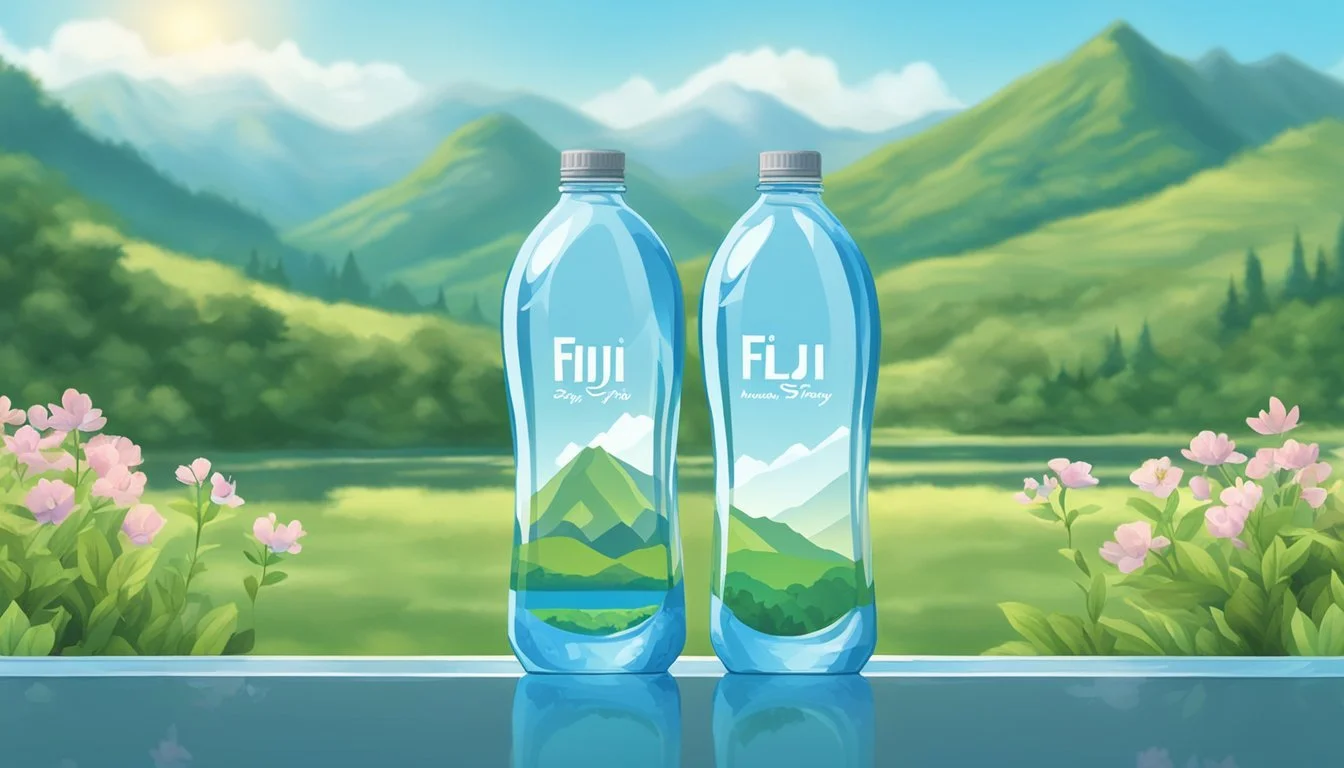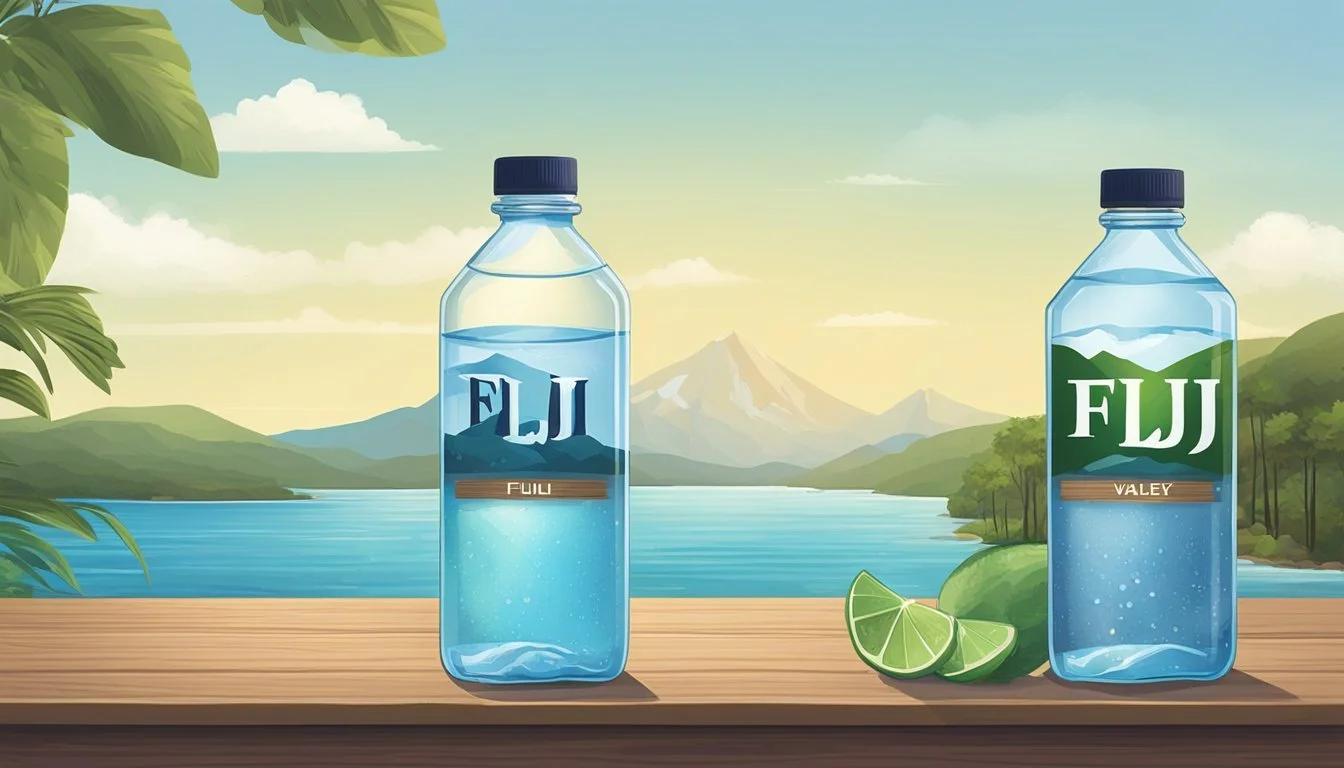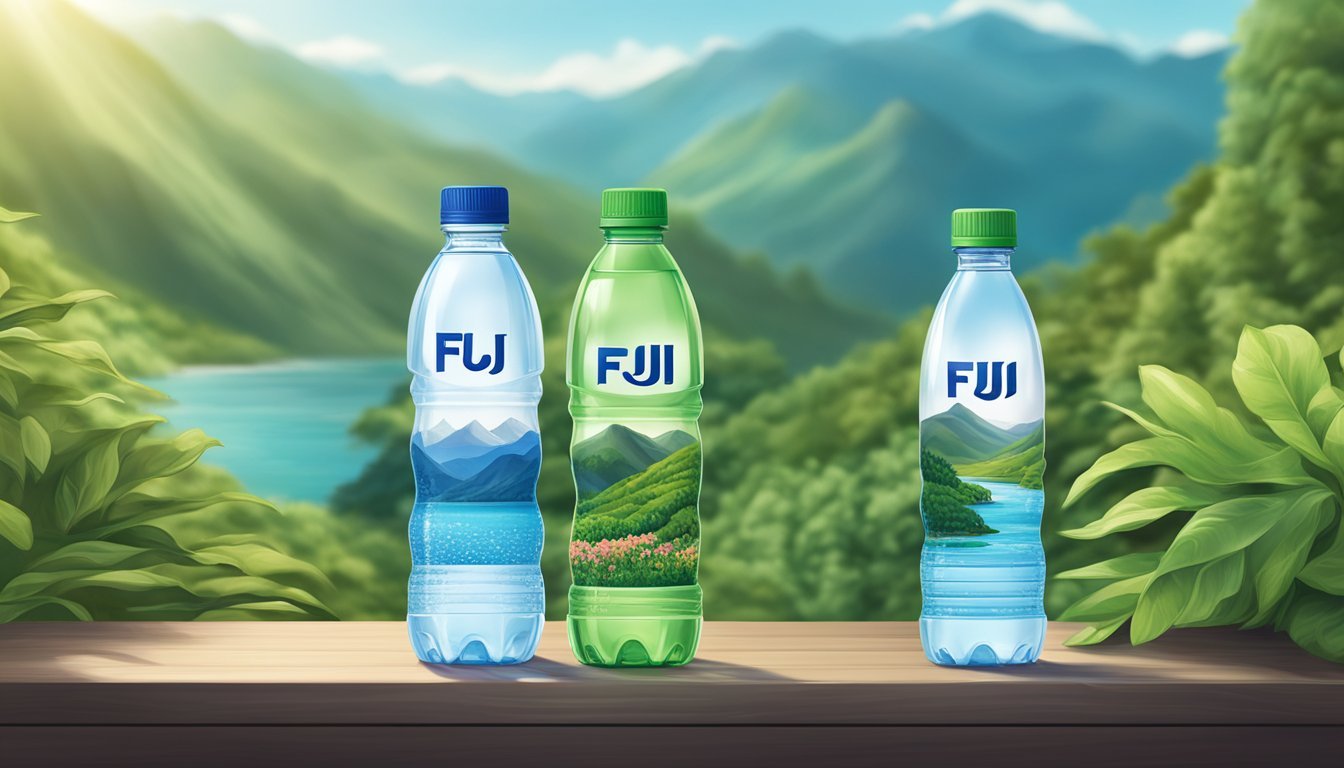Fiji vs. Mountain Valley Spring Water
A Comparison of Taste, Quality, and Sustainability
Choosing the right bottled water for your needs can be a daunting task given the variety of options available on the market. Two brands often stand out in the competition: Fiji Natural Artesian Water and Mountain Valley Spring Water. Both are reputed for their quality and distinctive tastes, making them popular among consumers who value purity and flavor in their bottled water choice.
Fiji Water, sourced from an underground aquifer in the Fiji Islands, is known for its soft mouthfeel and the presence of natural minerals. Mountain Valley Spring Water, on the other hand, originates from the Ouachita Mountains in Arkansas and is valued for its balanced pH and rich blend of minerals. The comparison between Fiji and Mountain Valley Spring Water is frequently based on their respective taste profiles, mineral content, and the sustainability of their sourcing and production processes.
Understanding the nuances of each brand’s offering is essential for consumers looking to make an informed decision. While Fiji boasts an exotic source and a slightly elevated mineral content, Mountain Valley is often celebrated for its long-standing history of delivering consistent quality. Each brand’s bottling practices and environmental impacts also play a significant role in determining which bottled water is the better choice for health-conscious and environmentally aware individuals.
The Basics of Bottled Water
When selecting bottled water, consumers often weigh factors such as the source of the water, mineral content, and pH level. These considerations can affect both the taste and perceived health benefits of the water.
Understanding Bottled Water
Bottled water is generally defined as water that is intended for human consumption and sealed in bottles or other containers with no added ingredients except that it may optionally contain safe and suitable antimicrobial agents. It includes various types that differ in their source, treatment processes, and potential health benefits.
Source: Bottled water may come from springs, artesian aquifers, or it can be tap water that has been further treated.
Treatment: Depending on its source, bottled water may undergo filtration, distillation, or reverse osmosis to remove impurities and contaminants.
Mineral Content: Some bottled waters are valued for their minerals and electrolytes, which are naturally occurring in spring water and mineral water, or added to purified water.
pH Level: The pH can range widely in bottled waters, with alkaline water having a higher pH, purportedly offering health benefits such as neutralizing acid in the bloodstream.
Regulations: Bottled water is subject to stringent regulations to ensure safety for consumption.
Types of Bottled Water
Bottled water can be categorized by its origin and the degree of processing it has undergone. Here are the main types:
Spring Water: Collected from a spring or through a borehole tapping the underground formation feeding the spring. It contains naturally occurring minerals and is typically characterized by a fresh taste.
Mineral Water: Similar to spring water, mineral water flows from underground sources. It's rich in minerals like calcium, magnesium, and potassium, which can remain in the water after treatment.
Purified Water: Including distilled water, purified water has been processed to remove chemicals and contaminants. This type often comes from tap water or groundwater.
Alkaline Water: This type of water has a higher pH level than standard drinking water. Alkaline water contains alkaline minerals and negative oxidation-reduction potential (ORP).
Distilled Water: Water that has been boiled into vapor and condensed back into liquid in a separate container. Distillation removes minerals and impurities.
By understanding these distinctions, individuals can make informed decisions when choosing the type of bottled water that best fits their preferences and needs.
Exploring Water Sources
When considering bottled water, the quality and origin of the water source are paramount. Both Fiji and Mountain Valley Spring Water boast distinctive sources, enriched with unique minerals and properties due to their geological settings.
Fiji's Natural Artesian Source
Fiji Water originates from a natural artesian aquifer located in the remote Yaqara Valley of Viti Levu, one of Fiji's two main islands. The water is naturally filtered through volcanic rock which adds to the mineral content and gives it a unique profile. This process ensures that the water is free from contact with the external environment until it is bottled.
Key Attributes:
Source: Natural artesian aquifer
Location: Yaqara Valley, Viti Levu, Fiji
Composition: Naturally filtered; rich in minerals from volcanic rock
Protection: Isolated from external elements
Mountain Valley's American Spring
Mountain Valley Spring Water is sourced from a natural spring in the Ouachita Mountains of Central Arkansas. They pride themselves on offering water that is pure and rich in minerals. The spring water travels through the unique geology of the region and is protected within the forested valleys, contributing to its high quality.
Key Attributes:
Source: Natural spring
Location: Ouachita Mountains, Arkansas, USA
Composition: Mineral-rich; influenced by local geology
Protection: Sourced from springs within protected lands
Both brands provide a product that is distinct not only in taste but also in mineral composition, directly influenced by the geology of their respective water sources.
Quality and Purity Standards
When comparing bottled waters, Fiji and Mountain Valley Spring Water, one must examine their filtration, treatment processes, and how they adhere to regulatory standards to ensure the provision of clean and quality drinking water.
Filtration and Treatment Processes
Fiji Water prides itself on deriving its product from an underground aquifer in the Fiji Islands, where the water is naturally filtered through volcanic rock. This process adds minerals and electrolytes while protecting the water from external elements. Fiji Water states that it has a high level of silica, which is known for providing a soft, smooth taste. Fiji also uses a multi-barrier approach, which includes microfiltration, ultraviolet light treatment, and ozonation to maintain the quality of its water.
On the other hand, Mountain Valley Spring Water sources its water from a spring in Arkansas, and it is filtered naturally as it flows through layers of rock. They emphasize on retaining the natural, pure quality of the water, which boasts a unique mineral composition, including calcium, magnesium, and potassium. Their water treatment includes ozonation and ultraviolet light processes to eliminate potential contaminants while preserving the natural mineral content.
Ensuring Safety: EPA and FDA Compliance
Both Fiji and Mountain Valley Spring Water comply with the regulations set forth by the Environmental Protection Agency (EPA) and are subject to the quality standards imposed by the Food and Drug Administration (FDA). These regulatory bodies set the limits for levels of contaminants and total dissolved solids to ensure the safety of bottled water.
Fiji Water: They ensure their bottling facility follows the FDA regulations for good manufacturing practices, which include inspections that test for contaminants such as heavy metals and organic compounds. They also use bottles made of high-grade PET plastic, which is BPA-free, ensuring that there is no leaching of plastic into the water.
Mountain Valley Spring Water: It is not only compliant with EPA and FDA regulations but also independently tests its water regularly for over 200 contaminants, committing to exceed governmental standards for clean drinking water. Their glass bottles are BPA-free, which they tout as a purer vessel for their naturally sourced water.
Both brands strive to provide high-quality, pure water through stringent filtration processes and compliance with federal standards.
Taste and Mineral Content
When comparing Fiji and Mountain Valley Spring Water, one must consider both the mineral content, which directly affects taste, and the pH levels that contribute to the overall freshness and feel of the water.
The Influence of Minerals on Flavor
Minerals such as magnesium, calcium, and potassium contribute significantly to the flavor profile of bottled water. Fiji Water is known for its high silica content, which imparts a smooth, silky taste. On the other hand, Mountain Valley Spring Water is praised for its balance of healthy minerals, providing a crisp and refreshing taste many consumers enjoy.
Fiji Water Mineral Content:
Silica: Contributes to smoothness
Calcium & Magnesium: Present in lower amounts
Mountain Valley Mineral Content:
Calcium: Adds to a crisp flavor
Magnesium: Enhances overall taste
Potassium: Balances the flavor
pH Levels and Alkalinity
The pH level of water impacts its alkalinity, with higher pH levels indicating more alkaline water. Alkaline water often tastes smoother and is preferred by some for its purported health benefits. Mountain Valley Spring Water typically has a pH from 7.3 to 7.7, indicating slightly alkaline water that can contribute to a clean and crisp taste. Fiji Water, while also slightly alkaline, has a unique chemical makeup due to the volcanic rock it filters through, resulting in a distinctive taste and feel.
pH Levels:
Fiji Water: Slightly alkaline
Mountain Valley Spring Water: Typically 7.3 to 7.7 pH
The mineral content and pH levels of both Fiji and Mountain Valley Spring Water are integral to their appeal, affecting not just their taste but also their perceived health benefits. Each brand brings its own characteristic flavor to the table, with the presence of minerals like calcium and magnesium and a water's alkalinity both playing a role in shaping the consumer experience.
Health and Nutrition Considerations
When assessing bottled water options like Fiji and Mountain Valley Spring Water, it's important to understand how their mineral content and electrolyte levels can affect hydration and overall health.
Electrolytes and Hydration
Water infused with electrolytes is critical for maintaining proper hydration because electrolytes regulate nerve and muscle function, hydrate the body, balance blood acidity and pressure, and help rebuild damaged tissue. While plain water can hydrate, the presence of essential minerals like sodium, potassium, calcium, and magnesium enhances water's ability to hydrate effectively. Fiji water is known to contain these essential minerals, which means it can support hydration and complement the body's natural balance of electrolytes.
Comparing Mineral Content
Mountain Valley Spring Water boasts a unique balance of minerals, as the water is sourced from a natural spring with a natural composition that is beneficial for the body. The specific mineral content of Mountain Valley Spring Water may offer a healthy blend of calcium, magnesium, and potassium.
Mineral Fiji Water (mg/L) Mountain Valley Spring Water (mg/L) Calcium 18 74 Magnesium 15 7.3 Potassium 5 1.0
Nestlé Pure Life, another popular bottled water mentioned in the search results, often includes additives such as sodium, or may have undergone processes that alter the natural mineral content. Adding minerals for taste is a common practice and should not be confused with naturally occurring mineral water.
In the context of health and nutrition, both Fiji and Mountain Valley Spring Water offer beneficial minerals without the need for added artificial ingredients, making them a preferable choice for those seeking pure and nutrient-rich hydration.
Environmental Impact and Sustainability
Fiji and Mountain Valley Spring Water are renowned brands in the bottled water industry. This section discusses their environmental impact and the sustainability measures they have taken, particularly focusing on waste management and bottling practices.
Bottled Water and Plastic Waste
Bottled water significantly contributes to plastic waste. Fiji Water predominantly uses plastic bottles, which impacts the environment due to the resources required to produce and dispose of the plastic. Sustainability concerns arise because plastic bottles can take hundreds of years to decompose, and not all plastic water bottles are recycled, leading to environmental pollution.
Mountain Valley Spring Water, on the other hand, offers its products in glass bottles, which are recyclable and can be reused multiple times. Glass bottles, while heavier and requiring more energy to transport, typically have a lower environmental impact when reused or recycled properly compared to plastic water bottles.
Sustainable Practices in Water Bottling
Some water bottling companies have adopted more sustainable practices to mitigate environmental concerns. For instance, boxed water alternatives present a reduction in plastic use, though the environmental benefits depend on the entire life cycle of the packaging and its disposal.
Mountain Valley Spring Water's use of reusable glass bottles stands out as a more sustainable option compared to single-use plastic bottles. This approach not only reduces waste but also implies lower pollution assuming effective recycling systems are in place.
Fiji Water has made claims of sustainability efforts, such as reducing packaging materials and investing in conservation and reforestation projects. However, the use of plastic bottles remains a dominant concern due to the lesser likelihood of recycling every bottle and the higher ecological footprint of plastic production.
Branding and Consumer Choices
In the competitive landscape of bottled water, branding and consumer choices play a pivotal role in shaping the market dynamics. The perception of quality and the convenience each brand offers can significantly influence consumer preference.
Market Presence and Brand Reputation
Fiji Water has established a robust market presence through its exotic branding and image of purity, associating its product with the pristine environment of Fiji. On the other hand, Mountain Valley Spring Water emphasizes its heritage and tradition, marketing its American-sourced spring water since 1871. Both brands face stiff competition from established names like Voss, Evian, and Smartwater, as well as lower-priced options such as Aquafina and Dasani.
Consumer Perception of Various Brands:
Fiji Water: Viewed as a premium product with high net favorability.
Mountain Valley: Praised for its natural sourcing and longstanding history.
Voss: Known for its stylish packaging and appeal to luxury markets.
Evian: Equated with a high-end lifestyle and French Alps source.
Nestlé Pure Life: Perceived as "painfully average," yet has a large market reach due to Nestlé's extensive brand portfolio.
Consumer Preference and Convenience
Convenience is a driving factor for many consumers, with the availability of products like Aquafina and Dasani in venues like Starbucks, influencing demand. Meanwhile, brands like Fiji Water and Mountain Valley Spring Water are often preferred by consumers looking for a specific taste or health-related attributes. Specialty waters such as Icelandic Glacial and Eternal Water are also gaining traction, although they might not be as readily available as mainstream brands like Poland Spring or Nestlé Pure Life.
Accessibility of Various Brands:
Widespread: Aquafina, Dasani, Poland Spring, Nestlé Pure Life (available in most retail stores)
Selective Distribution: Fiji Water, Mountain Valley, Voss, Evian (often found in health food stores or upscale markets)
Each brand's strategic pairing with certain lifestyle images or health claims also impacts their foothold in the market. For example, Smartwater and Lifewtr, owned by PepsiCo, bank on their associations with fitness and art, respectively. In essence, the branding and consumer choices in the bottled water industry are reflective of the diverse demands and perceptions across different market segments.
Cost Considerations
When comparing Fiji Water to Mountain Valley Spring Water, it is important to understand their pricing and what value consumers receive for their expenditure.
Pricing of Premium Bottled Waters
In the premium bottled water market, prices can vary widely, often due to factors such as source, packaging, and brand positioning. Fiji Water is known for being sourced from an underground aquifer in Fiji, contributing to its higher price point. Typical costs for Fiji Water can range from $2 to $5 per bottle, depending on size and retailer. Mountain Valley Spring Water has a rich history dating back to 1871 with sources in the Ouachita Mountains, and its pricing is often similar to Fiji, with prices ranging from $1.50 to $3.50 per bottle.
Brand Price per 16.9 oz bottle Fiji Water $2 - $5 Mountain Valley $1.50 - $3.50 Smartwater $1.50 - $2.50 VOSS $2.50 - $4 Evian $1.50 - $2.50 Acqua Panna $2 - $3 San Pellegrino $1.50 - $3
Analyzing Value for Money
Value for money in bottled water considers not just the cost but also the quality and taste. Fiji Water markets itself as "Earth's finest water," largely due to its naturally occurring minerals and filtration process. Consumers often report a distinct taste that justifies Fiji Water's expense. Mountain Valley Spring Water is valued for its balanced pH and notable mineral content. Given both brands command a similar price range, the determination of 'best bottled water' may come down to personal preference for taste and mineral content, rather than solely price.








